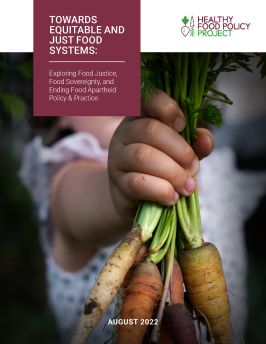Towards equitable and just food systems: Exploring food justice, food sovereignty, and ending food apartheid policy & practice
Stark inequities persist in access to nourishing food, with significant consequences for health and well-being. To support action focused on building healthier and more just food systems, this resource from the Health Food Policy Project explores three approaches for advancing equity in food systems: food justice, food sovereignty and ending food apartheid.
The resource defines each approach and highlights their differences and commonalities and their strengths and weaknesses. Intended for people whose work relates to local food systems, the authors argue that the words used — whether food justice, food sovereignty or food apartheid — help frame and guide policy solutions.
Policy examples
The resource outlines policy examples related to each approach. For instance, the authors cite Boulder, Colorado’s tax on sugary drinks, revenues from which are used to help improve access to nutritious foods and health equity, as an example of a food justice-related strategy (p. 9).
Regarding food sovereignty, which centres concerns around self-determination, Maine’s 2017 Food Sovereignty Act is offered as an example. This act provides municipalities with more control in regulating their food systems (p. 12).
A policy example to end food apartheid, which refers to racial inequities in access to nutritious food, is a resolution passed by St. Petersburg, Florida in 2021 declaring racism a public health crisis. Stating that Black Floridians have been segregated to neighbourhoods with restricted access to nutritious food and an overabundance of convenience foods and liquor stores, the resolution calls for the implementation of healthy public policies to advance racial equity (p. 15).
Additional information and resources
The resource provides links to additional information on each of the three approaches. Discussion questions are integrated throughout the resource to help readers reflect on what the terms food justice, food sovereignty and food apartheid mean to them, and their policy implications.
Relevance to public health
This resource provides a practical introduction to various approaches to advance equity in food systems. It will be useful for public health practitioners, decision-makers and policy-makers wanting to learn more about concrete strategies to help build healthy and just food systems.
Use this resource to
- Build understanding of food justice, food sovereignty and food apartheid
- Facilitate discussion and decision making on strategies to build healthier and more equitable and just food systems
Alignment with NCCDH work
Food systems impact health and well-being and should be considered by public health in policy and practice. The NCCDH is exploring food systems as a determinant of health and examining public health’s role in building healthier, more sustainable and just food systems.
The 2024 resource Determining Health: Food systems issue brief is the first NCCDH resource to explore this topic.
Related resources:
Podcast episode transcript & companion document: Disrupting food insecurity & fat phobia (Mind the Disruption, Season 1, Episode 5)
Bonus Episode: Tackling weight discrimination in nutrition and public health (Mind the Disruption, Season 1, Episode 9)
See other resources on food systems, food security and health equity.
Reference
Healthy Food Policy Project. (2022). Towards equitable and just food systems: Exploring food justice, food sovereignty, and ending food apartheid policy & practice. https://healthyfoodpolicyproject.org/wp-content/uploads/Towards-Equitable-and-Just-Food-Systems.pdf
Tags: Food systems, Healthy public policy, Racism/racialization, Academic Institution, Document, Report / Document
